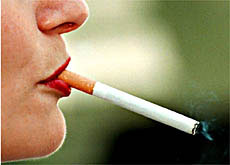Government reinforces “smoking kills” message

Cigarette packets are to carry more prominent health warnings after the government agreed to bring Switzerland into line with other European countries.
Terms such as “light” and “mild” will be banned from tobacco products as part of a concerted drive to remind the public of the dangers of smoking.
The revision of the tobacco ordinance comes into force on November 1. But manufacturers have 18 months to comply for cigarettes and 30 months for other tobacco products. This is to give them time to sell existing stock.
Health warnings, such as “Smoking can affect sperm and reduces fertility”, “Smoking causes fatal lung cancer” and “Smoking during pregnancy harms the health of your child”, will be carried in the three official languages – German, French and Italian.
They will appear on the front of each packet in big, black letters and take up a third of the space. Another warning will occupy 50 per cent of the back of each packet.
Manufacturers must also display prominently the tar, nicotine and carbon monoxide content on the sides of each cigarette packet.
The government is also considering whether packets should carry colour photos of diseased lungs, as is already the case in Canada.
Cigarette prices
Wednesday’s cabinet announcement comes at a time when the anti-smoking lobby appears to be gaining ground in Switzerland.
Earlier this month Geneva University announced it was banning smoking on campus; a similar ban now covers the shopping centre under Zurich station.
But the country still remains a smokers’ paradise, with few limits on lighting up in public places.
Cigarette prices, which have just been raised by 50 centimes to SFr5.80 ($4.80), are still low compared with other European countries.
“About one-third of the [Swiss] adult population smokes – the highest rate in Europe,” said Philippe Vallat, head of the national anti-smoking campaign.
“This is due to the very weak and liberal laws [that fail] to adequately protect non-smokers and help smokers quit.”
Changing climate
But the climate is changing, and the government has made it clear that tough measures are on their way.
Thomas Zeltner, director of the Federal Health Office, has said he wants to tighten advertising rules for tobacco products, raise cigarette prices and ban tobacco sponsors from sporting events.
Six parliamentarians – all doctors – have launched an initiative calling for all public places and buildings to be smoke free.
On Sunday, Interior Minister Pascal Couchepin said he was ready to resort to shock tactics to reduce the number of smokers in Switzerland.
His comments follow the European Union’s decision to launch a series of hard-hitting adverts about the health dangers of smoking.
Lung cancer
According to Verena El Fehri from the Swiss Association for Smoking Prevention, scientific studies pointing out the damage caused by passive smoking have acted as a wake-up call for the public.
A leaked report by Britain’s Scientific Committee on Tobacco and Health, which emerged this month, again warned that second-hand smoke massively increased the risk of lung cancer and heart disease
“Only in the past few years have people in Switzerland become aware that passive smoking is unpleasant and unhealthy,” said El Fehri.
She added that publications and the media had sensitised people to the problem and increased their acceptance of smoke-free public places.
Changing attitudes
In some parts of the country, attitudes have already changed.
Canton Geneva, which is home to the World Health Organization, has taken a pioneering stance in introducing anti-smoking measures, such as banning tobacco advertising on billboards.
But it is Italian-speaking Ticino that looks set to become the first Swiss canton to impose blanket restrictions on smoking in restaurants, bars and hotels.
The Ticino parliament has been asked to approve measures that would allow smoking only in designated areas. This would also apply to hospitals and government buildings.
Rightwing parties have protested that smoking restrictions would undermine freedom, and they have accused rival politicians of turning Ticino into the “Land of the Taliban”.
But both El Fehri and Vallat have welcomed the tougher line taken in Ticino, saying it is the only way of protecting non-smokers from passive smoking.
Opposition
However, a law protecting the rest of the Swiss population would appear some way off.
“It will take a few years before such a law exists and comes into force,” admitted El Fehri.
Vallat is even more pessimistic. He says a nationwide ban on smoking in public places – like the one introduced in Ireland earlier this year – is unlikely, because legislation concerning sectors such as the hotel trade is regulated locally.
A ban would also encounter strong opposition from the hotel and restaurant sector, as well as from the tobacco and advertising industries.
swissinfo, Katalin Fekete
According to a Swiss survey, 25% of non-smokers are affected by passive smoking at least one hour a day.
In Switzerland, 8,300 premature deaths are attributed to smoking every year.
Smoking generates costs of around SFr5 billion due to sickness and loss of productivity.

In compliance with the JTI standards
More: SWI swissinfo.ch certified by the Journalism Trust Initiative










You can find an overview of ongoing debates with our journalists here . Please join us!
If you want to start a conversation about a topic raised in this article or want to report factual errors, email us at english@swissinfo.ch.